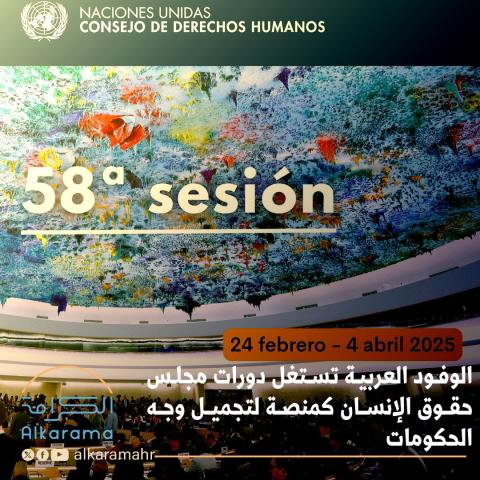
As usual, Arab government delegations exploit the sessions of the United Nations Human Rights Council as a platform for public relations campaigns and to improve their human rights records, rather than using interactive dialogues to develop a serious vision for improving the human rights situation and ending policies of repression and intimidation.
In this context, for example, the head of Saudi Arabia’s official Human Rights Commission, Hala Al-Tuwaijri, reiterated the official rhetoric in her speech during the opening of the 58th regular session of the Human Rights Council in Geneva. She repeated official narratives about alleged reforms through global events without addressing issues such as executions, arbitrary arrests, unfair sentences, and the lack of fair trials.
On March 6, 2025, the United Nations Human Rights Council is scheduled to review the report of the Special Rapporteur on the situation of human rights defenders, Mary Lawlor, following her visit to Algeria from November 25 to December 5, 2023. This report presents a crucial opportunity for states to remind Algerian authorities of their obligations regarding human rights.
Additionally, the Council is set to examine issues related to torture and other cruel, inhuman, or degrading treatment or punishment, including hostage-taking as a form of torture, in the context of the report by the Special Rapporteur on torture and other cruel, inhuman, or degrading treatment or punishment.
The Council will also review the protection of human rights by regional organizations in the context of counterterrorism, as well as issues related to civil society participation, sanctions, and military cooperation, in the report of the Special Rapporteur on the promotion and protection of human rights and fundamental freedoms while countering terrorism.
Among the countries whose human rights records will be reviewed is Qatar. The Human Rights Council will also examine the situation in Syria, particularly regarding arbitrary detention, enforced disappearances, torture, and ill-treatment at the hands of the former regime.
During the interactive dialogue session, interventions also addressed the persecution of the Rohingya Muslim minority in Myanmar, calling for their protection. Additionally, the situation in the occupied Palestinian territories was discussed in light of the genocide and widespread violations committed by the Israeli occupation in Gaza, the West Bank, and other occupied Arab territories, including the occupied Golan Heights.
UN Secretary-General António Guterres warned in his opening speech at the session that human rights are being "strangled one by one" around the world due to wars that deprive people of their rights to food, water, and education, as well as the spread of autocrats and "warmongers."
Guterres stated that human rights are at stake and are suffering severe blows, posing a "direct threat" to all mechanisms and systems that have been "hard-won" and established over the past 80 years to protect and promote human rights. He highlighted how conflicts cause widespread human rights violations, emphasizing that abuses have significantly escalated in the occupied Palestinian territories since October 7, 2023, where Gaza has witnessed "intolerable" levels of death and destruction.
The UN official also expressed "gravely concerned by the rising violence in the occupied West Bank by Israeli settlers and other violations, as well as calls for annexation."
